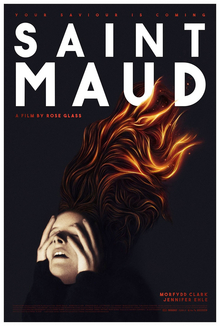Most of the short, independent horror films we take a chance on turn out not so well but occasionally we do get something like this which makes it all worthwhile. This is the feature debut of its director Rose Glass and it works both as a horror film and as an aperçu into the mind of someone suffering from an all encompassing delusion. While there are plenty of seemingly supernatural phenomena, this film is unambiguous in showing that it is all in the mind of the main character but that actually adds to the horror.
Maud is a private care nurse who lives in a seaside town. Her latest client is Amanda, a rich and famous dancer who is dying of cancer in her house. As Amanda is lonely, bitter and fearful of death, this leads the very devout Maud to feel that it is her purpose in life to accompany Amanda during her final days and lead her to Christ. While Amanda seems to humor Maud, even when she claims that Christ talks to her and she can physically feel his presence, she also seems to want to make the most of the life that she has left. She entertains guests, pays a companion for sexual services and even throws a birthday party. Amanda disapproves of all of this, believing that this is detrimental to Amanda’s soul and tries to interfere. Meanwhile we realize that Maud has come to her current religiosity due to some unspecified tragedy while she was a nurse in a hospital and has delusions that involve seeing portents and signs of God’s will everywhere around her.
It isn’t altogether obvious at the beginning that this is really a film about a woman with a serious psychological problem but I really love how the gradual transition is handled such that by the end it is absolutely clear to the audience that it is all in her mind. Neither the specifics of her illness nor the prior events that led to her mental breakdown are provided, which helps prevent the film from being ensnared in arguments about diagnosis and realism. There are also some subtle touches here and there which are rather brilliant. For example, the main character introduces herself to Amanda as Maud, but as we see when she runs into someone who knew her from her previous life, her real name is Katie. This tells her that her delusions run deep and she really has come to see herself as a saint and God talks to her personally. The various special effects, such as her seeing vortices form in the water in glasses, are still horrifying even though we know by then that it’s not real. When she puts on robes and a rosary, the religious imagery is powerful with no supernatural component required at all.
Apart from the scary depiction of Maud caught up in a powerful religion-inspired delusion, the film is also fascinating in how it shows Amanda living out her final days. She does apologize for making fun of Maud’s extreme devotion for her own amusement but otherwise it does seem that she has the right idea. She tries to make herself happy by dressing up nicely for guests and have fun while she can. Maud’s attitude is the polar opposite with her frightening dictum not to waste your pain, as to her there must be some meaning and purpose to the pain. This must her way of coping with the suffering that she witnessed and the failures to save lives as a nurse. As an atheist, I am of course receptive to how this shows up the shortcomings of a religious outlook that tries to explain away all suffering as part of some deity’s grand plan.
This film only slightly predated the current pandemic but it nicely demonstrates the stresses that healthcare workers are subjected to. As Maud’s former colleague realized, Maud needed an intervention and professional help from a mental healthcare specialist but all of them were too preoccupied by their own work at the time to help her. It’s always impressive how a film incorporates multiple themes like this in a package and the very fact that it’s grounded in reality makes it especially effective as horror. Highly recommended.
